July Update
It’s a few months and releases later from the March overview, so let’s see what is going on and how the new stuff stacks up. I’ll also take a look at some upcoming albums. You can see what I reviewed earlier in the year, here.

July Update
It’s a few months and releases later from the March overview, so let’s see what is going on and how the new stuff stacks up. I’ll also take a look at some upcoming albums. You can see what I reviewed earlier in the year, here.

Released April 21, 2023
Personnel:
Guests:
Krzysztof Drabikowski; Inga Habiba; Lunatic Soul
Sebastian Aleksandrowicz; Anna Drabikowska; Michał Górczyński; Mariusz Kumala; Dyba Lach; Mariusz Mielczarek; Nadhir; Maria Oldak; Tomasz Popkrzywiński; Kamil Popławski; Mariusz Rodziewicz; Igor Szeligowski; Krzysztof Szmytke.
Track List:
Music Inspired by Slavs is the fourth offering from the Music Inspired By… trio, who have intermittently been releasing largely instrumental thematic albums since about 1999. The last one, 2016’s Music Inspired by Alchemy, is reviewed here.
As the title suggests, the core inspiration for this album are the various deities of the Slavic pantheon. It is meant to be a musical imagining of a distant Slavic past, before conquest, science, and the imposition of a foreign religion, and the release is accompanied by lavish and detailed notes and artwork. There are eleven tracks related to the gods, organized somewhat geographically, interspersed with short, directional interludes to guide us. And so we pass through “Furta” (The Gate) into this lost world. Continue reading Album Review: Music Inspired by Slavs
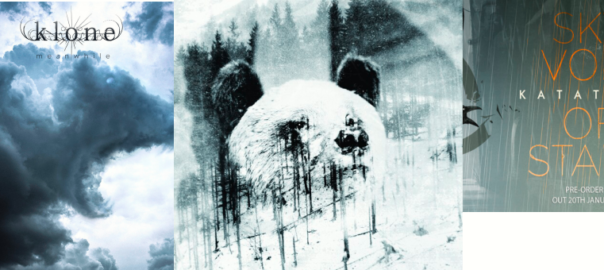
Generally I don’t have much to say about new music so early in the year, but there have been some interesting things out so far, and other interesting things are on the horizon. Several strong albums have already been released despite the risk of being forgotten by year’s end, and there are singles from what may be promising albums. I also want to comment on a couple things I missed from last year.
In terms of those albums — it is a strangely proggy year for me so far. I spend a lot of time complaining about modern prog and here I am ready to talk about modern prog. Go figure. And two of those albums are (at the moment) head-to-head contenders for Album of the Year. Yes it is early, and there always do seem to be surprises, so we shall see how things play out.
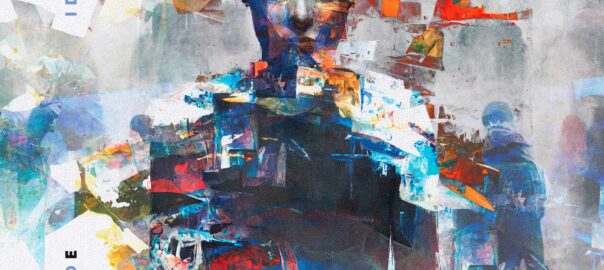
Released: January 20, 2023
Personnel
Tracklist
Bonus Tracks:
Algorithms. Influencers and Curated Lives. How to Change Your Life in Ten Words or Less. Memes. Monetization. Tracking. Filters and Avatars. Targeted Ads. Conspiracies. Expectations versus reality. Who is real and who is not? How much control over our lives do we really have?
With ID.Entity, Riverside’s 8th album, Mariusz Duda and his bandmates explore these themes: negotiating virtual realities, hanging on to one’s identity and self, fighting the ubiquitous and implacable presence of the data collectors and algorithms that tell us what we should want, trying to deal with the polarization and angry echo chambers of the online world.
We get some hints from the outset that things are different: the cover is by Polish artist Jarek Kubicki and it thrums with life. This is not the dark, sombre palette of the covers of most of the previous albums. Bright, fragmented shards of colour fly out against a stark white background; we can glimpse shadowy figures in the background. Does this new vision reflect what is inside? Continue reading Riverside: ID.Entity

It’s that time again, when, along with many other people, I maunder on about some music I heard in the past year. I’m not sure how many albums I did hear altogether, definitely more than the dozen I talk about, but I don’t make notes unless for some reason the album gets my attention long enough to play it more than once. A lot of albums don’t get that far. A lot of albums I don’t manage to get all the way through even once. I’m sure there is a lot of music that I have missed — there always is, mostly due to time constraints, and mood constraints, and the inability to listen to everything that gets recommended by various friends, musicians, and algorithms, but I do try.
Anyway, what follows is the music that did catch my attention sufficiently for me to revisit it. I think there is less variety than usual: metal and post-metal dominate, but there is a surprising amount of prog considering my general disdain for the modern form of the genre, some ambient/electronica, and a bluegrass album. I’d heard of every band on the list except for one, and that one proved to be one of the best discoveries for a long time. I found a couple of albums simply because it struck me that the band had been awfully quiet lately and maybe I should check what they were up to.
In terms of ranking… I’m beginning to wonder whether I should bother: at least, for anything not in the Top 3. I did a little research, looking back on my previous lists to see what albums had actually stood the test of time. It wasn’t quite as bad as I feared: for most years, a lot of my top picks have turned out to be albums that I still play. Not all years to be sure, and not all albums, but enough for me to continue to trust my own judgment. So take the top 3 as the top 3, and the rest in more or less rough order, as in — the ones near the bottom are less interesting than the ones near the top.
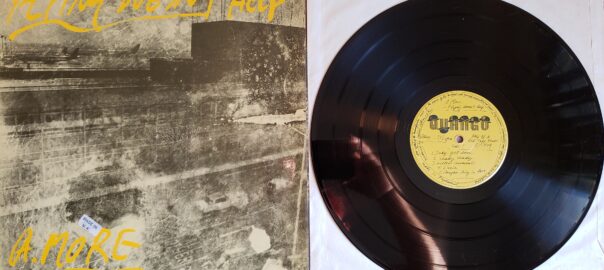
I started this project near the time I started my blog, but … I didn’t get very far with it. The intention was to revisit albums I own that are old, or obscure, or need more exposure — or maybe just to remind myself how good they actually are. It is a fair assumption that any album that appears here is one that I think has some merit, and who knows? Maybe someone reading these will find a new favourite.
This is the fourth album in the series. The others are here, here, and here. I hope you will check them out.
Flying Doesn’t Help
Released 1979
Personnel:
*Lyrics to “War” by Peter Blegvad
Tracklist:
Anthony Moore (his surname sometimes appears as More) is a British experimental composer and producer, although he has spent most of his career based out of Germany. He along with his school friend Peter Blegvad were briefly members of the British experimental avant-garde collective Henry Cow, but they soon left and in 1971 formed the avant-pop trio Slapp Happy, along with Dagmar Krause. Slapp Happy released several albums, a couple in collaboration with Henry Cow, but their eccentric and minimalist style, along with the fact that they refused to play live, caused the record labels to largely avoid them.
By 1977 Anthony Moore had returned to a solo career (he had recorded a couple of minimalist solo albums in the early 1970s); over the decades he has worked with Pink Floyd, Richard Wright, Kevin Ayers, Trevor Rabin, and Julian Lennon, and released a few more albums of his own.
Continue reading Blowing the Dust Off: Flying Doesn’t Help by Anthony More

Released: June 10, 2022
Personnel:
Guest: Rafał “Rasta” Piotrowski (Vocals on Track 6)
Tracklist
Heart Attack is a melodic thrash metal band from Cannes, France, who have been around since about 2007. I first heard them a few years ago and was struck by their combination of strong melody and brutal heaviness; I liked them well enough to get their 2017 album The Resilience. And while that album is very good, for this new one they have really stepped up their game.
Negative Sun is an album of crushing riffs and brutal drums, and maybe some of the best metal vocals I’ve heard. Compared to the previous album, the songwriting has become very tight and focused: enormous wall-of-metal is surrounded by a sophisticated handle on melody, almost orchestral at times, and head-bangingly heavy all the way.
The album starts out with “Rituals”, an instrumental/folk-ish intro, and their instrumentals can be quite deceiving: slow and lush — but wait for it. With “Septic Melody” they kick into high gear and never let up for the rest of the album. There are ten tracks over 45 minutes, so the songs are short and to the point, but they still manage to fit a lot of killer songwriting into each track.
The best tracks for me are “The Messenger”, anthemic and dense, with choral growl vocals over powerhouse riffage, and “Take Your Pride Back” with its monster chorus. I find “Twisted Sacrifice” (featuring guest vocals from Decapitated’s “Rasta” Piotrowski) and “Bound to this Land” slightly less memorable — but that may be because the best tracks are so strong. The album ends with a cover of Genesis’ “Jesus He Loves Me”; the original is satirical enough, but turning it into a thrash metal song is just the icing on the cake <throws horns>.
This is my favourite album of the year so far. Heavy and unpretentious and full of massive riffs and earworms, I have not yet tired of playing it. These guys are hugely good, and while they seem to be getting attention in the European metal press, they deserve to be a lot better known on this side of the world. Hopefully they will make it over for some festival or another.
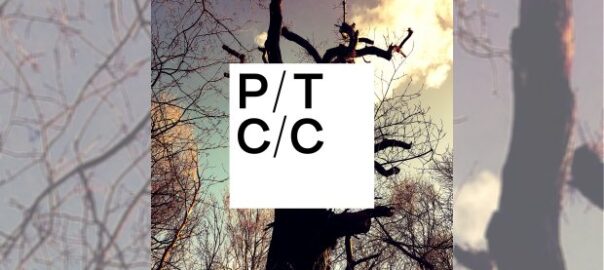
Released: June 24, 2022
Personnel:
Tracklist:
Bonus Tracks:
It is fair to say that, amongst a certain fan base, the most highly anticipated album of 2022 has been the new one from a newly resurrected Porcupine Tree. It is a slightly revised PT, however: for … reasons (given in various interviews from both sides if you are interested), Colin Edwin is not part of this version of the band, so Steven Wilson takes care of the bass playing. In recent interviews Wilson has also insisted that he never explicitly claimed that PT had ceased operations, and while this may be technically true, he spent a lot of the intervening years avoiding and redirecting questions about the band’s potential future, so the claim comes across as somewhat disingenuous, at best.
At any rate, huge excitement, hopeful caution, and downright cynicism accompanied the announcement of a new Porcupine Tree album and tour. Still, whatever one’s opinion about the reasons for the reunion, one thing was true — the singles that were released in the months preceding the album were not disappointing.
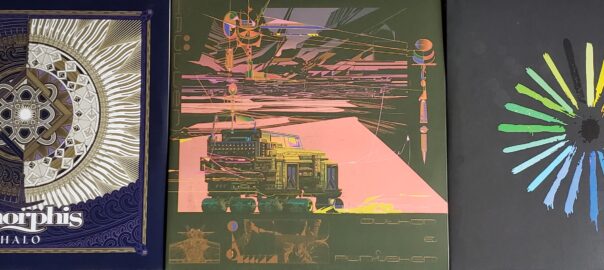
Well, it’s already May, and I haven’t updated the blog for a while.
What is new and exciting so far? There are a few new things to be sure, but not very many have caught my attention. I haven’t really had the time to dig in and listen to stuff, let alone search out new things.
That being said, some singles have hit in anticipation of new albums:
Porcupine Tree: “Of the New Day”
Steven Wilson and crew follow up the first single from 2021 with this one, much slower and more contemplative, but still managing to sound like a mash-up of earlier Wilson solo albums and Porcupine Tree — which is not to say that it is a bad or derivative song. It is not. Maybe not as instantly compelling as “Harridan”, and a bit more of a grower, but the two singles together suggest the upcoming album may be a pretty good one, whatever the reasons for its release.
Killing Joke: Lord of Chaos EP
There are two new tracks on this EP, and a couple of remixes of things from 2015’s Pylon. The new tracks are “Lord of Chaos” and “Total”, and these are worthy follow-ups to the angry melodic industrial post-punk of Pylon. It is, however, not clear whether a full-length album is to follow.
Decapitated: “Cancer Culture” and “Hello Death”
Technical death metal from Poland, beat-and-riff-heavy, relentlessly energetic, reminiscent of beloved early albums. “Hello Death” stands out because of guest vocalist Tatiana Shmayluk (Jinjer) who adds a whole level of richness with her soaring clean vocals, in opposition to Rafał Piotrowski’s angry growls.
Kellermensch: “6705”
The angst-ridden Danes are back after several years, with a new album in the works, due to be released on May 27th. The single is very much in the vein of songs from 2017’s Goliath: darkly melodic and orchestral, dealing with loneliness and broken relationships. Christian Sindermann’s plaintive voice may be an acquired taste, but it does fit the mood of the songs.
Shearwater: “Xenarthran” and “Aqaba”
Jonathan Meiburg has been busy: he released his first book last year (the very excellent A Most Remarkable Creature — a book that has nothing at all to do with music) and is still promoting it; and he also managed to finish the latest Shearwater album (The Great Awakening) which will be released in June. The album was released to crowdfunders early this year, so I have been listening to it for quite some time now.
The singles give a taste of what the album is like. Slow, contemplative, rather more acoustic than the previous album, and it can sound deceptively sparse, but it isn’t really. It hearkens back to earlier albums: in fact, “Aqaba” has very much the feel of “The Snow Leopard” from Rook, and if you know that song, you know that is not a bad thing at all.
Mariusz Duda: “News From the World”
This song does not presage a new album, but winds up the Lockdown trilogy of albums that Duda composed and released over the past two years. And it is an interesting song to end with; rather than being more of the sparse, jittery electronica of the Trilogy, it is dense and analog, with the three-part structure common to Duda’s best Riverside or Lunatic Soul tracks. It is certainly full of electronic washes and soundscapes, and it even begins in a deceptively Lockdown-ish way, but soon a slightly jazzy bass riff and actual drums take over. Piano dominates the middle third, before heavy rolling bass-and-drum riffs return. There are bits reminiscent of Lunatic Soul, and Eye of the Soundscape; it is by far the strongest track of the entire Trilogy, probably because this is where Duda’s strengths lie. I could stand a whole album like this.
Albums
At this point most of the albums I’m interested in are in the future. I’ve only picked up three new ones to date:
Author and Punisher: Krüller
Author and Punisher is the nom de plume of one Tristan Shone, industrial musician who takes the genre descriptor literally: he builds machines that make industrial music. No guitars or drums on his stage, just huge metal contraptions that he works with hands, feet, and voice, to produce enormous swathes of massive sound. He came to my attention a few years ago via the Spotify algorithm, back when it seemed to actually work — for some reason it suggested I might like this stuff.
It was not wrong. Author and Punisher makes brutal, dense, angry electronic noises, at least at his best. I’m not sure, alas, that Krüller is his best: this album sees his material somewhat more melodic, and less brutal, and somehow less effective. For me, only “Centurion” really stands out as indicative of what he can do, perhaps followed by the title track.
Amorphis: Halo
The Finnish folk metal masters have released an album that is very reminiscent of Under the Red Sky, and that is fine with me, because I liked that album very much. These guys present deeply melodic and heavy folk metal, full of catchy riffs, and really the best part of these songs is how well Tomi Joutsen switches between growl vocals and a rich clean tenor voice throughout the songs. He’s one of the best in the business at that. This is a nice and easy album to listen to, head-banging all the way.
Marillion: An Hour Before It’s Dark
Marillion, the long-standing neo-prog outfit, is a band that never did much for me. The level of adoration from many of my friends does lead me to occasionally try out yet another Marillion track, just to see if something has changed — and since I tend to find Fish and Hogarth both annoyingly mannered vocalists, it shouldn’t really matter what album I pick. Pretty much every attempt has resulted in a bemused “meh”.
So yeah, I was rather surprised (as were most of the people I know when I mentioned it) when I actually took to the new album. I can’t remember why I listened to it — I think I just liked the cover — and somehow, despite Hogarth’s nasal whine, the album itself works. Now it is not one that is ever going to make my all-time best list by any means — it doesn’t have that kind of depth or thoughtfulness or originality — but it is certainly accomplished, smooth, with some pretty lush moments. It is a good album to put on and just play.
And no, I won’t be attending any Marillion weekends.

Released to crowdfunders: December 2021
General release: January 2022
Personnel:
Guests:
Tracklist:
“A book read by a thousand people is a thousand different books.”
Sometimes you hear an album and you like it right from the get-go, and you always like it but it never really gets under the skin. Sometimes you hear an album and you think it’s great, but after a while the urge to hear it disappears and never really returns. And sometimes you hear an album and you think … well, that’s okay. But something makes you return to it. And return to it. And then you realize — this is great, in that sneaky, deep-down long-lasting way, an album you know is not going to wear out its welcome. Such is 1000 Books.
I had been a huge fan of Shriekback back in the day, their Jam Science and Oil and Gold albums being among my very favourite things from the 80s. They had some hits, too: “My Spine is the Bassline”, “All Lined Up” – classic 80s club tracks, as good as anything from back then. But after a while I stopped paying attention even though they had (in one form or another) been sporadically releasing albums over the years. They reappeared on my radar around 2015 with the album Without Real String or Fish (reduced from a quartet to a trio) which I liked well enough to encourage me to continue watching them and buying the (mostly crowd-funded) albums since.
1000 Books is their 16th album, and it hits on all cylinders. More than any of the other albums over the past few years (for me, anyway), it evokes most strongly the Shrieks of the 80s, in their heyday: that dark new-wave funkiness, bass-heavy and smart as hell (with some of the tastiest drumming I’ve heard in years), updated to the new century with a deep maturity.
There is not a weak song on this album. Starting with the electronic smoothness of “Space in the Blues” with its eerie winding background guitar solo, through the funk of “Unholiness”, to the contemplative distorted lament of “Wild World” we are taken on an immersive, thought-provoking journey, and the production is absolutely outstanding, probably the best I’ve heard for years.
But more than this. One of the outstanding features of the band has always been the arcane, allusive, and hugely literate lyrics, words that can stand on their own but are actually there in service to the music. A band can count itself lucky if it has one decent lyricist — Shriekback, remarkably, have two: both Carl Marsh and Barry Andrews write lyrics, with equal facility, and the album retains a consistency of vision and feel even though the lyricists are different song to song. They are among the best in the business. (They also share the the vocal job between them).
1000 Books came along very late in the year, and in fact the actual release to the general public did not happen until January 2022 (although originally meant to happen before
the end of the year), which technically makes it the first new album of 2022 — but to hell with it. This album is SO good that it takes the top spot for 2021. Maybe it will do the same for 2022.
You can preview the album on the band’s music page:
https://shriekback.com/music